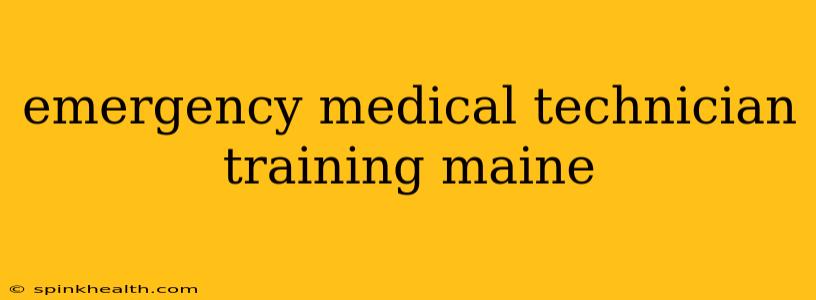The siren's wail, the adrenaline rush, the satisfaction of providing critical care – these are just a few of the aspects that draw people to the exciting and challenging field of Emergency Medical Services (EMS). If you're in Maine and harboring a desire to become an EMT, you've come to the right place. This comprehensive guide will navigate you through the EMT training process in the Pine Tree State, answering your burning questions and setting you on the path to a rewarding career.
My name is Sarah, and I've been an EMT in Maine for over 10 years. I've witnessed firsthand the dedication and skill it takes to succeed in this field, and I'm excited to share my knowledge and experience to help you navigate your journey.
What are the EMT training requirements in Maine?
Maine, like other states, has specific requirements for EMT certification. These generally include:
- Age: You must be at least 18 years old.
- High School Diploma or GED: A high school diploma or its equivalent is required.
- Background Check: A thorough background check is standard procedure, as this career necessitates a high degree of trust and responsibility.
- Physical Examination: You'll need a physical to ensure you're physically capable of handling the demands of the job.
- Successful Completion of an Approved EMT Program: This is the cornerstone of your journey, and we'll explore this in more detail below.
Where can I find EMT training programs in Maine?
Maine boasts several accredited EMT training programs across the state, often offered through community colleges, vocational schools, and hospitals. These programs typically adhere to the National EMS Education Standards, ensuring consistency and quality across the board. Researching and comparing these programs is crucial to finding the right fit for your learning style and schedule. Consider factors like location, program length, teaching methods, and the reputation of the institution.
How long does EMT training in Maine take?
The duration of EMT training varies depending on the program you choose and whether it's a full-time or part-time program. A typical EMT-Basic program can last anywhere from a few months to a year. Full-time programs will naturally be shorter than part-time options.
What does EMT training in Maine cover?
A comprehensive EMT training program in Maine will encompass a wide array of subjects, including:
- Emergency Medical Response: This covers scene safety, patient assessment, and initial treatment.
- Medical Emergencies: Managing various medical conditions like heart attacks, strokes, and diabetic emergencies.
- Trauma Emergencies: Handling injuries resulting from accidents, violence, or falls.
- Obstetrics and Pediatrics: Providing care for pregnant women and children.
- Airway Management: Essential skills in maintaining a patient's airway, including the use of advanced airway adjuncts.
- CPR and First Aid: Fundamental life-saving skills.
- Emergency Vehicle Operations: Safe driving techniques for emergency vehicles.
- Medical Terminology and Documentation: Accurate and efficient record-keeping.
What is the cost of EMT training in Maine?
The cost of EMT training can vary significantly depending on the institution and the program's length. It's wise to contact potential training providers directly to obtain accurate cost information and explore any potential financial aid options that may be available.
How do I get my EMT certification after completing training in Maine?
Upon successfully completing your EMT program, you'll need to pass the National Registry of Emergency Medical Technicians (NREMT) exam. Passing this exam is a crucial step toward obtaining your EMT certification in Maine. Many programs offer exam preparation assistance as part of their curriculum. After passing the NREMT exam, you will apply for your Maine state certification.
What are the career prospects for EMTs in Maine?
The demand for qualified EMTs in Maine, and across the nation, is consistently strong. Opportunities exist in various settings, including:
- Ambulance Services: Working for private ambulance companies or municipal EMS departments.
- Hospitals: Providing emergency care within hospital settings.
- Fire Departments: Many fire departments employ EMTs as part of their emergency response teams.
- Other EMS Systems: Various other roles within the broader EMS system.
Becoming an EMT in Maine is a challenging yet incredibly rewarding path. With dedication, hard work, and the right training, you can embark on a career that makes a real difference in the lives of others. Remember to research programs thoroughly, prepare diligently for the NREMT exam, and embrace the demanding yet fulfilling world of emergency medical services. Good luck on your journey!

